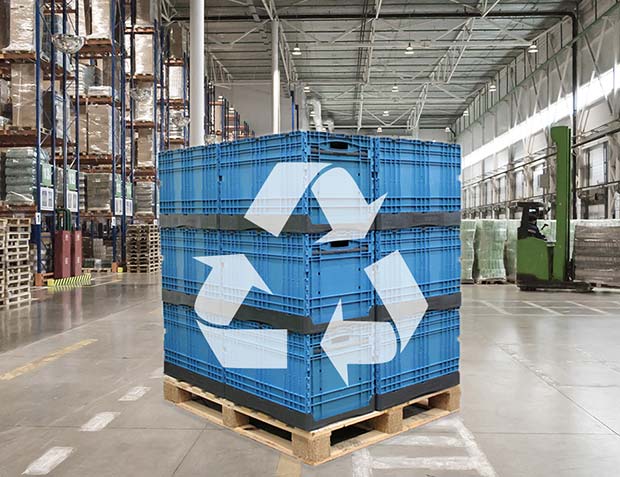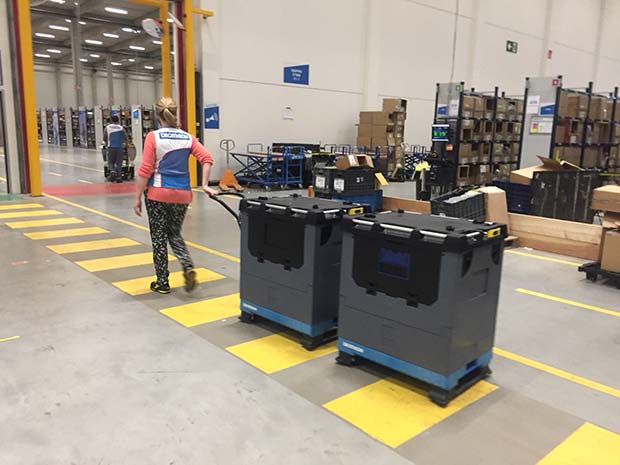With companies and their customers fast realising the damage of plastic waste and Greenpeace announcing that every minute a truck load of plastic enters our oceans, supply chains are beginning to switch out single use packaging for reusable transit packaging (RTP).
 Zero avoidable waste by 2050 is the new target for the market today, according to the Chartered Institute of Waste Management and there is significant pressure coming from consumers, government bodies and environmental organisations to ensure that this vision is fulfilled. The environmental organisation WRAP is leading this movement with the UK Plastics Pact which so far has been signed by 70 companies, including the top five UK grocers.
Zero avoidable waste by 2050 is the new target for the market today, according to the Chartered Institute of Waste Management and there is significant pressure coming from consumers, government bodies and environmental organisations to ensure that this vision is fulfilled. The environmental organisation WRAP is leading this movement with the UK Plastics Pact which so far has been signed by 70 companies, including the top five UK grocers.
WRAP estimated that 1.2 million tonnes of plastic film from packaging arises in the UK waste stream every year, of which around two thirds are from household and one third from commercial, industrial and agricultural sources. Consumable one-trip packaging such as film, cardboard and plastic banding are not only damaging our planet but also offer no return on investment, provide little opportunity to influence design and make for an untidy operation. Therefore, not only are businesses starting to realise reusable packaging is better for the environment, it is also turning out better for business.
Loadhog has been challenging the reusable packaging industry with innovative and sustainable designs for 16 years, reporting its best year in 2017, achieving sales turnover of £9.5 million representing 26% growth. Although the market is growing with this new found awareness, more can be done by businesses to remove damaging resources from their supply chain by re-inventing how they produce, package and sell products. According to WRAP, 60% of stretch wrap applications within food and drink are still carried out manually, which is typically less efficient than wrapping machines. The Loadhog Pallet Lid is even more efficient and was designed to eradicate the need for stretch wrapping, with the UK market committing 220,000 tonnes of stretch wrap to landfill when the original product was launched back in 2003.
More recently the swap-out scheme, in which Loadhog takes a company’s old containers, recycles them in-house and then moulds a new design, was recently utilised by the global sports retailer Decathlon. The business approached Loadhog with the need for a new Collapsible Container design with benefits and features that suited its operation. Furthermore, Decathlon requested that the container be made from recycled material but remain robust enough to withstand the harsh environment of its distribution networks. This container, along with a fully re-usable, collapsible and stackable plastic packaging system is being used today throughout Decathlon’s worldwide supply chain.
 Loadhog general manager, Shaun Khan said: “There has been increased awareness of single use plastic pollution and much interest from high investing key companies, particularly from the postal, retail and automotive sectors. These factors are no doubt responsible for our growth. We actively encourage companies, such as Decathlon, to recycle its own containers with our ‘swap-out’ scheme and to invest in recycled material through innovation and the redesign of returnable packaging, with no adverse effects on performance, ergonomics and aesthetics. Returnable packaging is certainly a growing industry and a hugely valuable market which we will continue to support.”
Loadhog general manager, Shaun Khan said: “There has been increased awareness of single use plastic pollution and much interest from high investing key companies, particularly from the postal, retail and automotive sectors. These factors are no doubt responsible for our growth. We actively encourage companies, such as Decathlon, to recycle its own containers with our ‘swap-out’ scheme and to invest in recycled material through innovation and the redesign of returnable packaging, with no adverse effects on performance, ergonomics and aesthetics. Returnable packaging is certainly a growing industry and a hugely valuable market which we will continue to support.”
From these promotional incentives Loadhog has experienced increased investment in reprocessed material with 50% of the plastic used within their production last year being recycled. This supports the company’s environmental commitment which is mirrored internally through a dedicated and controlled life cycle perspective. Loadhog is encouraging more and more blue-chip companies to take the plunge and invest in reusable packaging. However, with single use plastic waste continuing to find its way into the ocean the change may need to come about quicker than 2050.
LOADHOG




Comments are closed.